Information injection-pump assembly
ZEXEL
101603-0771
1016030771
ISUZU
1156018571
1156018571
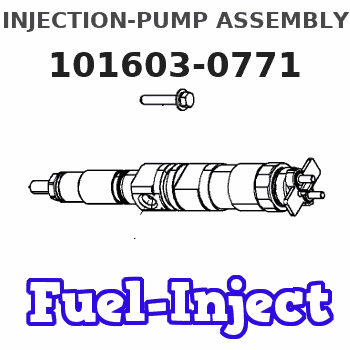
Rating:
Cross reference number
ZEXEL
101603-0771
1016030771
ISUZU
1156018571
1156018571
Zexel num
Bosch num
Firm num
Name
Calibration Data:
Adjustment conditions
Test oil
1404 Test oil ISO4113 or {SAEJ967d}
1404 Test oil ISO4113 or {SAEJ967d}
Test oil temperature
degC
40
40
45
Nozzle and nozzle holder
105780-8140
Bosch type code
EF8511/9A
Nozzle
105780-0000
Bosch type code
DN12SD12T
Nozzle holder
105780-2080
Bosch type code
EF8511/9
Opening pressure
MPa
17.2
Opening pressure
kgf/cm2
175
Injection pipe
Outer diameter - inner diameter - length (mm) mm 6-2-600
Outer diameter - inner diameter - length (mm) mm 6-2-600
Overflow valve
132424-0620
Overflow valve opening pressure
kPa
157
123
191
Overflow valve opening pressure
kgf/cm2
1.6
1.25
1.95
Tester oil delivery pressure
kPa
157
157
157
Tester oil delivery pressure
kgf/cm2
1.6
1.6
1.6
Direction of rotation (viewed from drive side)
Right R
Right R
Injection timing adjustment
Direction of rotation (viewed from drive side)
Right R
Right R
Injection order
1-5-3-6-
2-4
Pre-stroke
mm
3.6
3.55
3.65
Beginning of injection position
Drive side NO.1
Drive side NO.1
Difference between angles 1
Cal 1-5 deg. 60 59.5 60.5
Cal 1-5 deg. 60 59.5 60.5
Difference between angles 2
Cal 1-3 deg. 120 119.5 120.5
Cal 1-3 deg. 120 119.5 120.5
Difference between angles 3
Cal 1-6 deg. 180 179.5 180.5
Cal 1-6 deg. 180 179.5 180.5
Difference between angles 4
Cyl.1-2 deg. 240 239.5 240.5
Cyl.1-2 deg. 240 239.5 240.5
Difference between angles 5
Cal 1-4 deg. 300 299.5 300.5
Cal 1-4 deg. 300 299.5 300.5
Injection quantity adjustment
Adjusting point
-
Rack position
12.6
Pump speed
r/min
1000
1000
1000
Average injection quantity
mm3/st.
76.8
75.2
78.4
Max. variation between cylinders
%
0
-2.5
2.5
Basic
*
Fixing the rack
*
Standard for adjustment of the maximum variation between cylinders
*
Injection quantity adjustment_02
Adjusting point
H
Rack position
9.5+-0.5
Pump speed
r/min
260
260
260
Average injection quantity
mm3/st.
8.1
6.8
9.4
Max. variation between cylinders
%
0
-14
14
Fixing the rack
*
Standard for adjustment of the maximum variation between cylinders
*
Injection quantity adjustment_03
Adjusting point
A
Rack position
R1(12.6)
Pump speed
r/min
1000
1000
1000
Average injection quantity
mm3/st.
76.8
75.8
77.8
Basic
*
Fixing the lever
*
Injection quantity adjustment_04
Adjusting point
I
Rack position
15.3+-0.
5
Pump speed
r/min
150
150
150
Average injection quantity
mm3/st.
92
92
100
Fixing the lever
*
Rack limit
*
Timer adjustment
Pump speed
r/min
1350--
Advance angle
deg.
0
0
0
Remarks
Start
Start
Timer adjustment_02
Pump speed
r/min
1300
Advance angle
deg.
0.5
Timer adjustment_03
Pump speed
r/min
1400
Advance angle
deg.
2
1.5
2.5
Timer adjustment_04
Pump speed
r/min
1500
Advance angle
deg.
4.5
4
5
Remarks
Finish
Finish
Test data Ex:
Governor adjustment
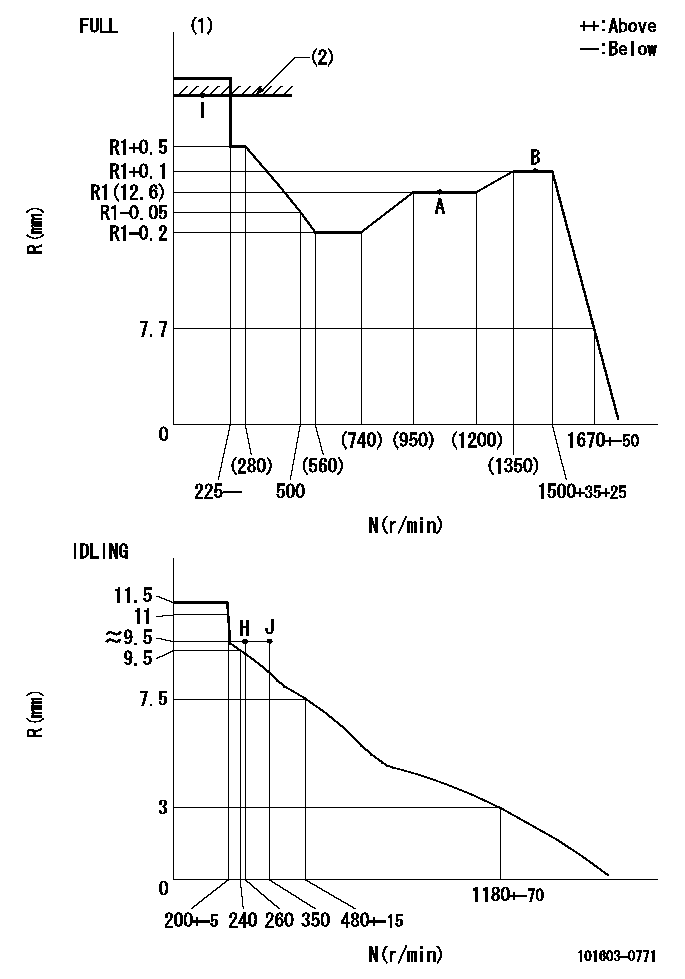
N:Pump speed
R:Rack position (mm)
(1)Torque cam stamping: T1
(2)RACK LIMIT
----------
T1=C32
----------
----------
T1=C32
----------
Speed control lever angle
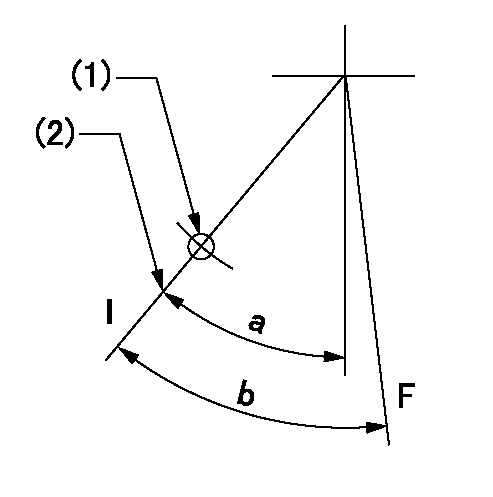
F:Full speed
I:Idle
(1)Use the hole at R = aa
(2)Stopper bolt set position 'H'
----------
aa=45mm
----------
a=21.5deg+-5deg b=(43deg)+-3deg
----------
aa=45mm
----------
a=21.5deg+-5deg b=(43deg)+-3deg
Stop lever angle
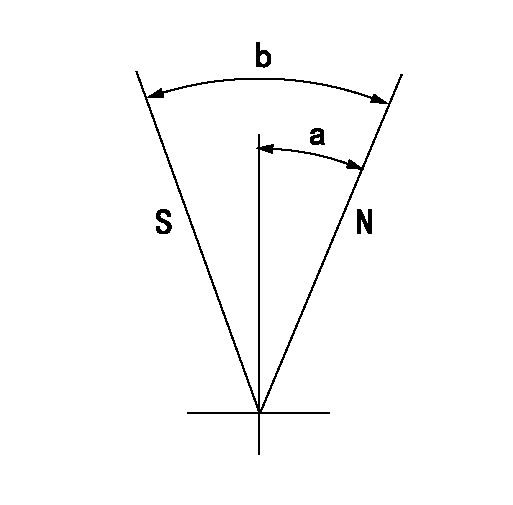
N:Pump normal
S:Stop the pump.
----------
----------
a=25deg+-5deg b=40deg+-5deg
----------
----------
a=25deg+-5deg b=40deg+-5deg
Timing setting
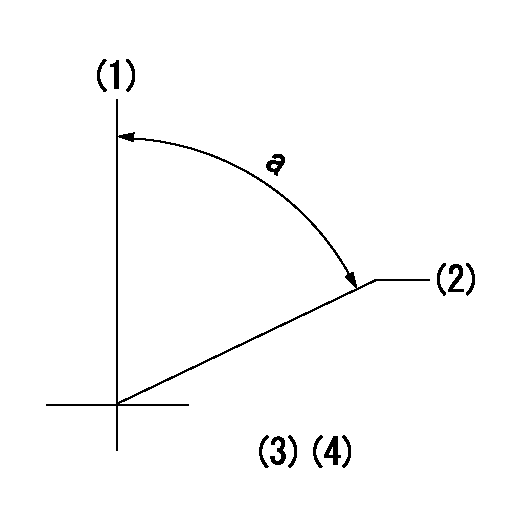
(1)Pump vertical direction
(2)Position of timer's threaded hole at No 1 cylinder's beginning of injection
(3)B.T.D.C.: aa
(4)-
----------
aa=12deg
----------
a=(60deg)
----------
aa=12deg
----------
a=(60deg)
Information:
1. Remove tube and elbow (1).2. Remove tube and oil sump (2). 3. Turn the crankshaft until two of the pistons are at top center and two are at bottom center.
Put identification marks on the connecting rod caps as to their location in the engine. Keep the caps with their respective piston.
4. Remove nuts (3), and remove connecting rod bearing cap (4).5. Remove the lower bearing half from the connecting rod cap. Push the connecting rod away from the crankshaft, and remove the upper bearing half.
Use tape to hold the bearing halves together and to identify the number of the cylinder.
6. Install the upper bearings in the connecting rods. Be sure the tab on the back of the bearing fits in the groove of the connecting rod. Install the connecting rod bearings dry when the clearance checks are made. Put clean engine oil on the connecting rod bearings for final assembly.7. Carefully pull the connecting rods onto the crankshaft.8. Install the lower bearings in the connecting rod caps. Be sure the tab on the back of the bearing fits the groove of the cap.9. Check the bearing clearance with Plastigage as follows:a. Put clean oil on the connecting rod bolt threads.b. Align the number on bearing cap (4) with the number on the connecting rod, and install bearing cap (4) with a line of Plastigage across the bearing.c. Install the nuts finger tight; then tighten them to a torque of 100 N m (75 lb.ft.).d. Remove the connecting rod cap, and measure the thickness of the Plastigage to the bearing clearances. See Engine Specifications for correct bearing clearances.e. Carefully move the connecting rod up enough to permit clean engine oil to be put on the upper bearing and crankshaft journal.f. Carefully pull the connecting rod onto the crankshaft.g. Install connecting rod cap (4), and tighten the nuts to the proper torque. The Cadmium plated nuts (silver color) are to be tightened to a torque of 100 N m (75 lb.ft.). The Phosphated nuts (dull black color) are to be tightened to a torque of 130 N m (95 lb.ft.).h. Repeat the procedure for the remainder of the connecting rods.10. Install tube and elbow (1) and tube and oil sump (2).End By:a. install oil pan
Put identification marks on the connecting rod caps as to their location in the engine. Keep the caps with their respective piston.
4. Remove nuts (3), and remove connecting rod bearing cap (4).5. Remove the lower bearing half from the connecting rod cap. Push the connecting rod away from the crankshaft, and remove the upper bearing half.
Use tape to hold the bearing halves together and to identify the number of the cylinder.
6. Install the upper bearings in the connecting rods. Be sure the tab on the back of the bearing fits in the groove of the connecting rod. Install the connecting rod bearings dry when the clearance checks are made. Put clean engine oil on the connecting rod bearings for final assembly.7. Carefully pull the connecting rods onto the crankshaft.8. Install the lower bearings in the connecting rod caps. Be sure the tab on the back of the bearing fits the groove of the cap.9. Check the bearing clearance with Plastigage as follows:a. Put clean oil on the connecting rod bolt threads.b. Align the number on bearing cap (4) with the number on the connecting rod, and install bearing cap (4) with a line of Plastigage across the bearing.c. Install the nuts finger tight; then tighten them to a torque of 100 N m (75 lb.ft.).d. Remove the connecting rod cap, and measure the thickness of the Plastigage to the bearing clearances. See Engine Specifications for correct bearing clearances.e. Carefully move the connecting rod up enough to permit clean engine oil to be put on the upper bearing and crankshaft journal.f. Carefully pull the connecting rod onto the crankshaft.g. Install connecting rod cap (4), and tighten the nuts to the proper torque. The Cadmium plated nuts (silver color) are to be tightened to a torque of 100 N m (75 lb.ft.). The Phosphated nuts (dull black color) are to be tightened to a torque of 130 N m (95 lb.ft.).h. Repeat the procedure for the remainder of the connecting rods.10. Install tube and elbow (1) and tube and oil sump (2).End By:a. install oil pan